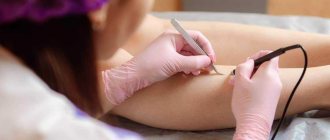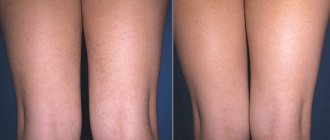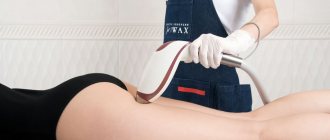From this article you will learn:
- The essence of the procedure
- How does the laser hair removal procedure work?
- Can pregnant women have laser hair removal?
- Consequences of laser hair removal for mother and child
- Contraindications to the procedure during pregnancy
- At what stages of pregnancy can laser hair removal be done?
- What areas are allowed to be treated with laser during pregnancy?
- How to prepare for laser hair removal during pregnancy
- Skin care after a laser hair removal session
- Is laser hair removal allowed while breastfeeding?
- What hair removal methods are prohibited for pregnant women?
- Safe hair removal methods during pregnancy
Many expectant mothers do not know whether laser hair removal can be done during pregnancy. Some women try to avoid laser exposure so as not to endanger the fetus. Others want to look well-groomed while pregnant and do not see a threat in this method of hair removal. Doctors do not have a unanimous opinion on this issue.
Laser hair removal is not prohibited during pregnancy, although it can only be done in certain areas and within strictly defined periods. Proper preparation and subsequent skin care are important. Before deciding on a session, you should carefully read the existing contraindications, risks and nuances. This is what today's material is dedicated to.
Epilation and depilation: what is the difference
Depilation refers to any hair removal technique that does not violate the integrity of the follicle. Hair grows again after a certain time.
These methods include:
- mechanical depilation;
- sugaring;
- waxing;
- shaving;
- chemical creams;
- bio resin;
Epilation is a technique that leads to the complete destruction of the follicle, after which hairs no longer grow.
This includes:
- electrolysis;
- thermolysis;
- laser hair removal;
- photoepilation.
These terms are often confused, not only by service users, but even by the professionals themselves.
Hair removal and depilation methods prohibited during pregnancy
Hair removal with devices for pregnant women in intimate places is prohibited. The fact is that laser and photoepilation are relatively new procedures. Experts have not yet fully studied how laser and light pulses affect the fetus and the condition of the expectant mother.
Although these methods are almost painless and have minimal negative consequences, it is better to avoid them while carrying a baby.
Electrolysis is an old method. Its essence is to connect an electrode to each hair and destroy its root using an electrical impulse. The procedure is long, painful, and can leave burns. It is strictly prohibited for pregnant women to use it. It is also not recommended to use chemical creams for the intimate area, as well as other areas of the skin. They can cause an allergic reaction, and they contain components that it is better for pregnant women not to come into contact with.
The essence of the procedure
Can pregnant women have laser hair removal? Before discussing this issue, let’s figure out what the essence of the procedure is. Laser hair removal allows you to remove unwanted hair from any area of the skin on the face and body. Hair follicles contain a high molecular weight pigment - melanin. It is capable of absorbing light waves of a certain length. Under the action of a laser, melanin absorbs light energy. As a result, heating and destruction of the hair occurs. It will take several weeks before the excess hair falls out after the procedure.
To completely remove unnecessary hairs, one laser hair removal session is not enough. The laser acts on bulbs in the active growth stage (anagen). To capture excess vegetation in other phases, several treatments are required at intervals of 3-6 weeks.
Recommended articles on the topic:
- How to massage the abdomen for weight loss: different techniques for health and beauty
- Stone massage: description, benefits, methods
- MRI of three parts of the spine: when is it necessary and what are the features of the procedure
Lasers for hair removal differ in wavelength: alexandrite, aluminum garnet, diode, long-pulse. Taking into account your skin type, the specialist will select the right device before the procedure.
A long wavelength is accompanied by a high pulse power, increasing the effectiveness of the procedure. This increases the likelihood of side effects: burns, swelling or pigmentation may appear. To ensure laser hair removal is safe, you need to go to a salon. Qualified specialists will take a responsible approach to the procedure and will be able to provide proper preparation. Only in the hands of professionals can the negative consequences of laser hair removal be avoided.
Epilation of the bikini area during pregnancy
Any hair removal technique (laser, flash, electric pulses) affects not only the surface of the skin, but also the deeper layers. The intimate area is located next to the uterus, so the effect of the devices on the internal organs and the fetus is unpredictable. It is not advisable to resort to such methods during lactation.
The opinions of cosmetologists and doctors on the safety of the listed techniques differ. Some claim that there is no harm in hair removal for pregnant women. Still, it is better to refrain from it.
There are many other methods for removing unwanted vegetation in a delicate place that are approved for expectant mothers.
Can pregnant women have laser hair removal?
Doctors do not give a definite answer as to whether pregnant women can have laser hair removal. Half of the experts are convinced that the procedure does not harm the health of the mother and her child. They argue this with minor unpleasant sensations that may arise during the session. The other half believes that the procedure is prohibited for pregnant women. They justify this by the inability to predict what effect laser radiation actually has on the fetus.
Can pregnant women have laser hair removal on their face or body? Each woman expecting a baby decides for herself. There are currently no published studies confirming the safety of the procedure for the developing fetus. Many doctors advise laser hair removal when the baby is born.
The progression of pregnancy is accompanied by a decrease in the pain threshold. Because of this, slight external influence can cause discomfort and sometimes cause pain. This can negatively affect the health of the pregnant woman and her baby. If the expectant mother feels pain, the body will immediately react. Hypertonicity of the uterus may occur, which threatens premature birth.
Safe methods of hair removal for women during pregnancy
The most important rule for a woman expecting a child is not to try anything new. Epilation of the body and bikini area during pregnancy should be habitual in order to avoid allergic reactions, irritations, and pain that are undesirable during such a period.
So, the methods approved for pregnant women.
Mechanical epilator
Many girls are used to doing hair removal with a machine. There are no contraindications to this method for pregnant women. You can continue shaving your intimate area without any worries. Difficulties may arise in the last trimester due to a large belly. In this case, you can temporarily resort to other methods or visit a cosmetologist.
It is not recommended to start using the machine during pregnancy for those who have not done this before. The first 2-3 times the process will cause severe pain, which will result in stress for the body. In addition, an inflammatory skin reaction is possible. Therefore, the method is suitable only for those who have been using it for a long time.
Waxing
Wax (wax) is a highly hypoallergenic product and does not contain hazardous chemicals. You can epilate a bikini while in position using this method. If a woman is used to doing this on her own, then she will easily cope until her belly begins to grow. Do not take uncomfortable positions and squeeze the fetus. When it becomes difficult to do waxing at home, it is better to go to a cosmetology office.
As in the case of a mechanical epilator, wax depilation should be done only by those who have resorted to it before, otherwise a painful shock is possible, which is very bad for the nervous system of a pregnant woman.
Sugarnig or phytoresin
The method is depilation with sugar paste consisting of natural ingredients, which means it is a suitable way to get rid of hair for pregnant women. The paste is cooked using sugar. It is absolutely safe for the body. The process is less painful compared to wax and machine. Even those girls who have never done it before can start doing bikini hair removal. The same applies to bioresin. Let's take a closer look at this issue, look at the nuances from a medical point of view, and learn for sure about the safety of sugaring during pregnancy from a specialist.
Medical opinion
While expecting a baby, the expectant mother may notice increased growth of body hair. This is due to an increase in the hormone progesterone in the body, so hair removal with sugar paste may be a solution for the expectant mother. Before sugaring, you should consult your doctor to avoid the following risks:
- Uterine tone. During sugar depilation, hair is removed from the root, which entails painful sensations. This can cause uterine tone and lead to miscarriage. This risk exists in the first and second trimesters. In III, the danger is minimal and even acceptable before childbirth.
- Introduction of pathogenic bacteria under the skin. There is such a risk when depilating with sugar paste..
From the master's point of view
The specialist must be aware of the client’s “situation” in order to assess all the risks before performing the procedure.
- This is not the first time that depilation has been carried out. For a woman who has been attending sessions for a long time, her hair becomes thin, brittle and weak. In this case, sugaring can be done with the permission of the doctor.
- The pregnancy is progressing well according to the gynecologist.
How does the laser hair removal procedure work?
Before starting work, the specialist must do a trial test. This way he will be able to assess the sensitivity of the client’s skin to the laser. If a person experiences discomfort (such as a burning sensation), anesthesia will be required. To relieve pain, the areas of skin where hair removal is planned are treated with a special gel. It helps reduce pain, improves the glide of the device, making the procedure more comfortable.
After a trial test, the specialist begins laser hair removal. The iris of the human eye, like hair, contains the pigment melanin. Laser radiation has a negative effect on the iris, so you need to take care of it before the procedure. You can protect your eyes with special glasses. They cannot be removed during the entire session.
We recommend
Laser aesthetic cosmetology: the perfect technique for an ideal appearance Read more
Laser hair removal is carried out on dry skin after preliminary cleansing. The equipment is customized individually for the client depending on the phototype and sensitivity of his skin. When the adjustment is completed, the doctor begins to move the device over the area to be epilated. Hair is removed using flashes.
The duration of the laser hair removal procedure is not always the same. The session lasts from 5 to 60 minutes. The time depends on the area of the epilated area and the frequency of the pulses. The result is not immediately visible. Hair falls out within 14 days after the procedure.
Useful tips before sugaring
Careful preparation is a must.
- The minimum hair length should be 3 mm, not exceed 8 mm, and the optimal length is 4–5 mm. It will take about two weeks to grow such hair. If previously sugaring sessions were carried out repeatedly, then due to the thinning of the hair roots, it will be possible to remove hair even with a minimum length.
- Having achieved the effect of hair weakening, brittleness and loss, it is a mistake to use a razor or depilatory cream between procedures, since the roots will become thicker again and there will be more hair.
- Before a sugaring session, apply a little scrub with your fingers in a circular motion to the desired areas of the skin, and then rinse it off with water. This will help prepare it and prevent further ingrown hairs.
- Particular attention should be paid to the hygiene of the intimate area.
Basic Precautions
Before sugaring, the expectant mother should not only prepare her skin for depilation, but also take certain precautions.
- One day before the procedure, you should stop using fatty creams.
- If there are wounds and abrasions on the body, depilation in these areas will have to be abandoned, as this can aggravate the damage, promoting the proliferation of pathogenic microbes. Care should be taken when treating moles, warts, and blood vessels located on the surface of the skin.
- You need to pay attention to your pain threshold, which may change with the onset of an interesting situation.
You can carry out the procedure yourself in the early stages, but it is better not to risk it and immediately contact a specialist. The cosmetologist will instruct you on how to care for your skin after the session to avoid irritation and inflammation.
Anesthesia during pregnancy
Hair removal for pregnant women can be performed under local anesthesia. It is worth highlighting several drugs for pain relief.
- Emla cream 5%, which contains lidocaine and prilocaine. It is applied to the skin in a thin layer, without rubbing, and covered with cling film for one hour. Then remove with a towel or wash off with water. This cream helps reduce pain. But to use it during pregnancy, you must consult your doctor. You can purchase it at a pharmacy or directly from a sugaring specialist.
- Spray with lidocaine 10%, which affects only the mucous membrane. It is least suitable for pain relief in the bikini area. Apply the spray 3-4 hours before the procedure, covering the skin area with cling film. Before use, consultation with a doctor is required.
- Painkiller tablet (nurofen, ketonal, nise). This method is prohibited for pregnant women due to the harmful effects of the drug components on the child.
- Before the sugaring procedure, you can steam the skin, so the unpleasant sensations will be less noticeable.
- There is a theory that from 10 to 11 and from 19 to 21 – during these periods of time, pain is dulled, so it is permissible to try it.
Shaving
The most popular and safest way to remove unwanted hair during pregnancy. You can shave your bikini area at any time. The main thing is to do this carefully so as not to scratch the skin. You cannot shave your body dry; a special shaving cream and gel will make the procedure easier.
In the last trimester, doing intimate depilation with a razor yourself will become inconvenient. You will have to use a mirror or ask a loved one for help.
How to prepare for laser hair removal during pregnancy
Careful preparation is required before laser hair removal. It is very important for pregnant women who need to protect themselves and their baby from possible negative consequences.
Preparation includes several stages.
- Preliminary consultation with a gynecologist. The specialist will assess the general condition of the pregnant woman. If necessary, he will prescribe tests. The gynecologist will not only conduct a full examination, but also give the necessary recommendations.
- Consider the need for the procedure. A woman must understand that the health and life of the child may depend on her current decision.
- Consultation with a cosmetologist. The specialist will determine the patient’s phototype, talk about the features of the procedure, and answer any questions.
- Refusal to visit the solarium or tanning. The ideal time for laser hair removal is the onset of cool weather (autumn-winter).
- Depilation with a razor. It is necessary to reduce the length of hairs in the affected area to 1-3 mm. You can use a razor a week before your hair removal session. It is strictly forbidden to remove hair with wax, epilator or sugaring.
- Cleanse the skin. You should refrain from applying decorative cosmetics and skin care products.
- Put on glasses. Pregnant women will need special glasses to protect their irises from the laser.
Follow the tips listed. Their implementation will reduce the risk of complications and negative effects on the pregnant woman and her child.
Limitations for depilation using the above methods
- It is advisable to use any technique other than a razor after consulting a doctor and excluding any individual contraindications.
- If a pregnant woman has varicose veins, waxing and sugaring should not be done.
- During the period of bearing a child, many women experience increased sensitivity and irritability. If a previously familiar method of hair removal begins to cause severe discomfort, it is better to give it up for a while.
- The slightest threat of miscarriage becomes a complete contraindication to any type of hair removal other than a razor. The deadline in this case does not matter.
- In a woman carrying a fetus, the skin's reaction to usual procedures may also change. If there is increased irritation or inflammation of the skin after the procedure, it is better to change the depilation method to a more delicate one.
Skin care after hair removal
After epilation, the bikini area may become swollen and red. Various means are used to relieve irritation. “Bepanten” gives an excellent wound healing effect, especially after epilation of a deep bikini using current. You can use calendula ointment or tincture (an alcohol solution will cause a short-term burning sensation), regular baby powder, aloe cream or a strong chamomile infusion.
Important! Increasing pain, severe redness and swelling are signs of a burn. In this case, you should seek medical help.
General recommendations:
- You should not heat your bikini area in a sauna or just a hot bath.
- Put off exercising and going to the gym.
- Avoid tanning for 2-6 weeks to avoid pigmentation. As a last resort, use sunscreen with an SPF of at least 30.
Do not attempt deep bikini hair removal yourself unless you have the appropriate training and experience. Experiments at home can end disastrously: from complete lack of effect to burns and scars. Only an experienced specialist will select the optimal hair removal method and rid you of unwanted hair in the bikini area without negative consequences.
Questions and answers
Is it possible to wax the butt?
Yes, but it is advisable that this is not the first time, otherwise the pain will be too strong, and this is stress for the nervous system.
If I did deep bikini waxing several years before pregnancy, can I do it during pregnancy?
Wax is not contraindicated for pregnant women. If the procedure is as comfortable as before, then you can continue to do it.
Until what time can you do sugaring or waxing?
If you feel well - right up to the last days. There are girls who did waxing a day or two before giving birth. But it is better to plan so that the last procedure is performed on average 2 weeks before the birth.
Is it possible to do sugaring while breastfeeding?
Yes, in the absence of contraindications. This method is the most gentle hair removal procedure during this period, since only natural ingredients are used.
What to do if you can’t shave yourself because of your belly, but you’re embarrassed to ask someone else?
If the woman is not prepared, in the prenatal ward the nurses themselves shave the hair of the woman in labor. Don't be shy, everyone's hair grows.
How long can it be done?
Without exception, doctors say that in the first trimester of pregnancy a woman should avoid any risks to her and her fetus. Thus, it is better to avoid laser hair removal in the first three months.
This is due to the fact that during this period the likelihood of spontaneous abortion is higher than ever. Moreover, it is in the first trimester that all systems and organs of the embryo are formed. Therefore, if there is even the slightest doubt about any external influence, it is better to avoid it.
In the second trimester, the body’s condition stabilizes and it becomes more resilient. At this time, hair removal is allowed.
As for the third trimester, it is also better to refuse the procedure during it. Any discomfort during this period can cause premature birth.









